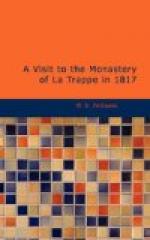I embarked early in the morning with a favourable breeze from the west: we soon began to be interested, and almost enchanted, with the rich and beautiful scenery, which almost every moment opened to our view in endless variety. This scenery not only pleased the eye and imagination by its beauty, but also excited high and deep interest by the fertility which it displayed. The banks were lined with corn fields, vineyards, or orchards. Occasionally the nature and interest of the prospect were agreeably diversified by the spire of a convent or the turrets of a chateau, rising above gardens or groves, or rich woodlands. At other places there were still more decided marks of population, for villages, country-houses, and farms, caught the eye, and added to the charms by which it was so willingly and powerfully detained.
The whole country on each side is well cultivated. But even this part of France, interesting and beautiful as it is, cannot be traversed without the recollection of the horrors of the revolution breaking in upon, and greatly damping the interest and pleasure derived from the view of the scenery. As we approached the ruined tower of Oudon, it was impossible not to feel a melancholy regret at the scenes of unparalleled bloodshed that took place on the rich and delightful banks of this river during the phrenzy of the revolution. These dreadful recollections assailed us most powerfully as we came in view of Ancenis on the left, and of Saint Florent le Viel to the right. At the latter place we stopped for the night. It was a fine serene evening, the wind had left us, and we were forced to track the shore for some distance before we reached it: just as the sun was setting I made a sketch of its ruined convent on the hill.
[Illustration: TOUR D’OUDON on the RIVER LOIRE.]
[Illustration]
After the defeat of the Vendean army, and their retreat across the Loire at this place, says a French writer, “There were seen upon the right bank, following the army, which increased prodigiously, a multitude of bishops, priests, monks, religious persons, old countesses, baronesses, &c. &c. who were carried off by cart-loads, and which did nothing but embarrass the army.[11] There were a great many of them killed at the battle of Mans”.
[Footnote 11: On gaining the heights of St. Florent, one of the most mournful, and at the same time most magnificent spectacles, burst upon the eye. These heights form a vast semicircle; at the bottom of which a broad bare plain extends to the edge of the water. Near an hundred thousand unhappy souls now blackened over that dreary expanse,—old men, infants and women, mingled, with the half-armed soldiery, caravans, crowded baggage waggons and teams of oxen, all full of despair, impatience, anxiety and terror:—Behind, were the smoke of their burning villages, and the thunder of the hostile artillery;—before, the broad stream of the Loire, divided by a long low




